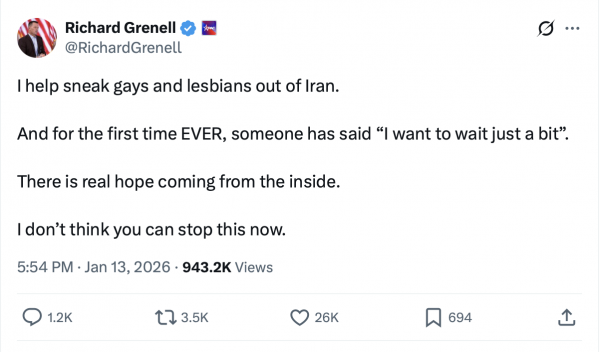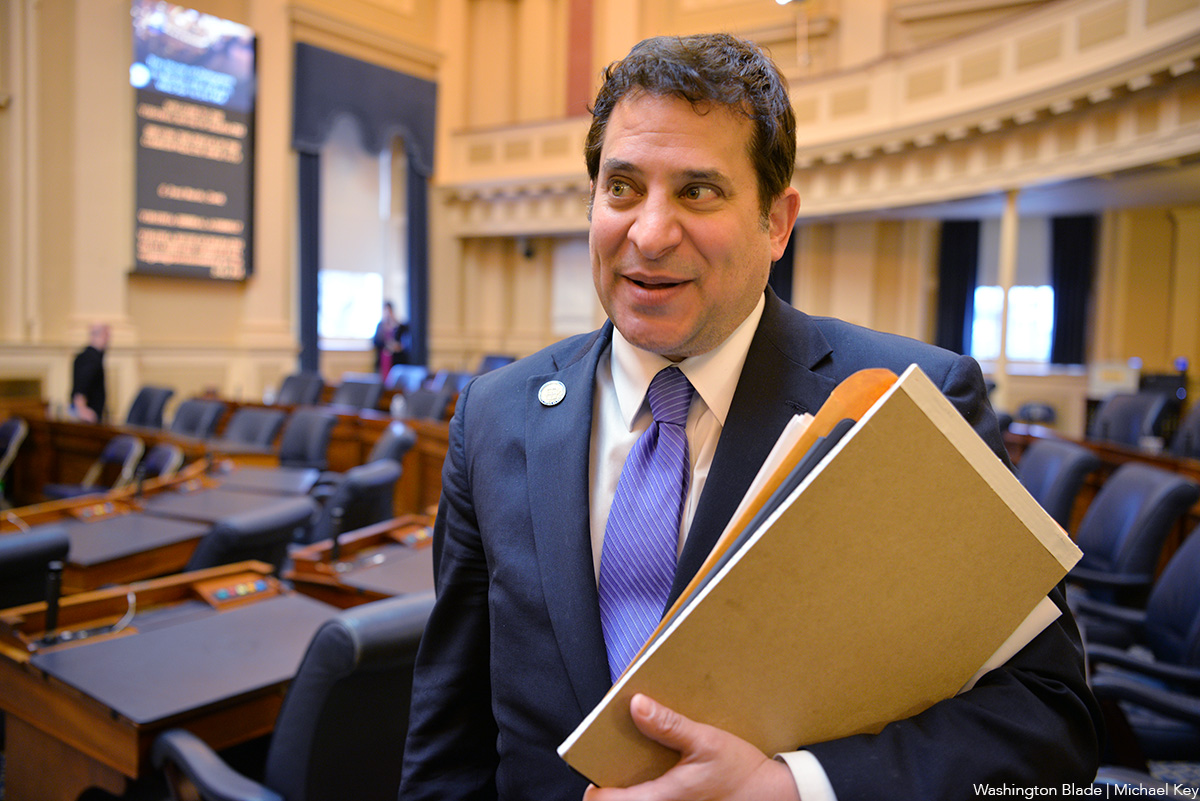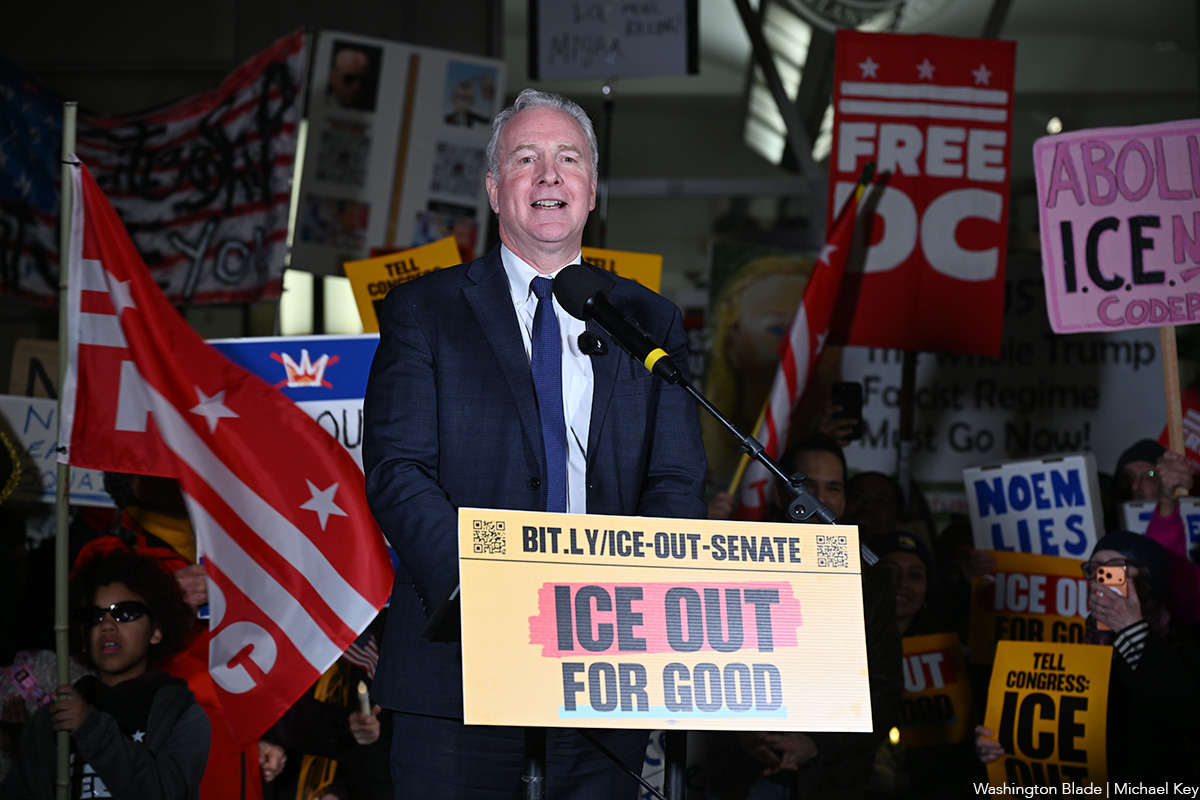News
Carney: ENDA would make executive order ‘redundant’
LGBT advocates pounce on notion that directive unnecessary if law enacted


White House Press Secretary Jay Carney said he believes an executive order would be redundant with ENDA in place. (Washington Blade file photo by Damien Salas)
White House Press Secretary Jay Carney said Thursday he believes passage of the Employment Non-Discrimination Act would make “redundant” an executive order barring LGBT discrimination among federal contractors — an assertion that advocates say is untrue as they continue to press for both legislation and the directive.
Carney made the remarks in response to a question from the Washington Blade on whether passage of ENDA — which has already passed the Senate, but remains pending in the House — would change the thinking of President Obama on the executive order, which he continues to withhold despite continued pressure from LGBT rights supporters.
“I think if the law passed — and I’m not a lawyer — and I haven’t read every sentence of the law, but I think if a law passed that broadly banned this kind of employment discrimination, it would make redundant an executive order,” Carney said.
Carney articulated his belief that an executive order would be “redundant” in the event ENDA became law after emphasizing the broad-based protections under the bill, which applies not just to federal contractors, but to many public and private employers.
“I think the employment non-discrimination legislation, the Employment Non-Discrimination Act, would broadly apply, and that’s one of the reasons why we support it,” Carney said. “Because it’s a broad solution to the problem, and it ought to be passed by Congress.”
When the Blade pointed out there are possible instances of LGBT discrimination that ENDA wouldn’t cover, but may be covered under the executive order, Carney called such potential acts of anti-LGBT job bias “hypothetical.”
“Well, that could be, hypothetically, but I think we’d like to see the legislation passed,” Carney said. “That would be a good thing.”
LGBT advocates disputed the notion that an executive order barring LGBT discrimination would be redundant if ENDA were law, saying both are necessary to enable greater legal protections for LGBT workers.
Fred Sainz, vice president of communications for the Human Rights Campaign, said his organization is directly at odds with Carney’s assertion and blasted the White House spokesperson for being “completely out of step.”
“We couldn’t disagree more,” Sainz said. “Even if ENDA passed tomorrow, we’d still want the EO. His assertion is completely out of step with over 60 years of social change strategy related to enduring legal protections for race and gender and more recently for hate crimes and non-discrimination protections on the basis of sexual orientation and gender identity. What he’s asserting is the equivalent of saying that if ENDA passed tomorrow, we wouldn’t need non-discrimination laws in the majority of states that still don’t have them. That’s absolutely not the case.”
Other categories for individuals — race, color, religion, sex or national origin — are protected under current law by Title VII of Civil Rights Act of 1964, which is enforced by the U.S. Equal Employment Opportunity Commission, and by Executive Order 11246, which is enforced by the Labor Department’s Office of Federal Contract Compliance. Both were put in place under former President Lyndon Johnson.
Ian Thompson, legislative representative of the American Civil Liberties Union, said both ENDA and an executive order are needed to provide “parallel protections” for LGBT people enjoyed by other categories of workers.
“Race discrimination, for example, is prohibited under both Title VII of the 1964 Civil Rights Act and Executive Order 11246,” Thompson said. “It’s certainly our opinion and our view that the same should apply to LGBT workplace discrimination as well. Even if ENDA were to be passed and signed into law tomorrow, we would still advocate for and want the executive order, and absolutely, definitely do not see it as redundant.”
Rea Carey, executive director of the National Gay & Lesbian Task Force, also insisted that legislation and an executive order are necessary to provide full protections to LGBT workers.
“We need both,” Carey said. “We urge the president to use his power and act immediately with an executive order that protects millions of LGBT employees who work for federal contractors and we urge Congress to follow the lead of the Senate and pass ENDA. Rights delayed are rights denied.”
One difference between the executive order and ENDA would be the enforcement mechanism. If ENDA were law, anti-LGBT discrimination would be still be allowed by small businesses, or companies with fewer than 15 employees, as well as by religious organizations in a broader way than other groups because of ENDA’s religious exemption. But if an executive order were in place — and modeled after the existing executive order barring discrimination among other groups — companies exempt under ENDA could face penalties as long as they do $10,000 a year in business with the U.S. government.
According to Freedom to Work, under ENDA, a victim must first file a complaint with the EEOC before an investigation into anti-LGBT workplace discrimination can take place. But under the executive order, the Labor Department could proactively investigate a company for such discrimination — even if no complaint were filed. In fact, the Labor Department regularly conducts audits of federal contractors to determine if they’ve engaged in discrimination under the current directive.
Tico Almeida, president of Freedom to Work, took Carney to task, saying he’s incorrect and apparently unfamiliar with the Obama administration’s work against employment discrimination.
“When he calls the executive order ‘redundant,’ Mr. Carney is wrong on the law, and surprisingly, he’s even wrong on the facts about the Obama administration’s own successful record enforcing the existing executive order banning racial and sex discrimination at federal contractors,” Almeida said. “In order to have full equality under the law, LGBT Americans need both the statute and the executive order because they have distinct enforcement procedures, and more discrimination can be prevented when both policies work in tandem.”
Almeida added that Carney should consult with “dedicated public servants” at the Labor Department, which, among other victories, under Executive Order 11246 recently won a $2.2 million settlement with federal contractor Cargill in a set of hiring discrimination cases on behalf of nearly 3,000 African-American, Latino and female job applicants — even with a law barring this discrimination in place.
“LGBT Americans deserve these same workplace protections that the Obama Labor Department has been enforcing for other hardworking Americans,” Almeida said. “There’s no good reason to leave only the LGBT community out of the workplace protections that have been applied by the Labor Department to everyone else.”
Also during the briefing, Carney responded to an email from Democratic National Committee Treasurer Andrew Tobias in which he told LGBT donors on an off-the-record listserv the executive order should be signed and its absence is “frustrating and perplexing.”
“I think that there are lot of strongly held views on these matters,” Carney replied. “The president believes very strongly in employment non-discrimination. That’s why he has urged Congress to act on the ENDA legislation. We’ve seen some progress on that. It needs to be completed. Those who oppose it are standing in the way of history and they’ll look foolish in the future as future generations look back at that stance and recognize it for what it is. I just don’t have any updates for you on the EO that you mentioned.”
Iran
Grenell: ‘Real hope’ for gay rights in Iran as result of nationwide protests
Former ambassador to Germany claimed he has sneaked ‘gays and lesbians out of’ country

Richard Grenell, the presidential envoy for special missions of the United States, said on X on Tuesday that he has helped “sneak gays and lesbians out of Iran” and is seeing a change in attitudes in the country.
The post, which now has more than 25,000 likes since its uploading, claims that attitudes toward gays and lesbians are shifting amid massive economic protests across the country.
“For the first time EVER, someone has said ‘I want to wait just a bit,” the former U.S. ambassador to Germany wrote. “There is real hope coming from the inside. I don’t think you can stop this now.”

Grenell has been a longtime supporter of the president.
“Richard Grenell is a fabulous person, A STAR,” Trump posted on Truth Social days before his official appointment to the ambassador role. “He will be someplace, high up! DJT”
Iran, which is experiencing demonstrations across all 31 provinces of the country — including in Tehran, the capital — started as a result of a financial crisis causing the collapse of its national currency. Time magazine credits this uprising after the U.N. re-imposed sanctions in September over the country’s pursuit of nuclear weapons.
As basic necessities like bread, rice, meat, and medical supplies become increasingly unaffordable to the majority of the more than 90 million people living there, citizens took to the streets to push back against Iran’s theocratic regime.
Grenell, who was made president and executive director of the John F. Kennedy Center for the Performing Arts last year by Trump, believes that people in the majority Shiite Muslim country are also beginning to protest human rights abuses.
Iran is among only a handful of countries in which consensual same-sex sexual relations remain punishable by death, according to the Death Penalty Information Center.
Virginia
Mark Levine loses race to succeed Adam Ebbin in ‘firehouse’ Democratic primary
State Del. Elizabeth Bennett-Parker won with 70.6 percent of vote

Gay former Virginia House of Delegates member Mark Levine (D-Alexandria) lost his race to become the Democratic nominee to replace gay state Sen. Adam Ebbin (D-Alexandria) in a Jan. 13 “firehouse” Democratic primary.
Levine finished in second place in the hastily called primary, receiving 807 votes or 17.4 percent. The winner in the four-candidate race, state Del. Elizabeth Bennett-Parker, who was endorsed by both Ebbin and Gov.-elect Abigail Spanberger received 3,281 votes or 70.6 percent.
Ebbin, whose 39th Senate District includes Alexandria and parts of Arlington and Fairfax Counties, announced on Jan. 7 that he was resigning effective Feb. 18, to take a job in the Spanberger administration as senior advisor at the Virginia Cannabis Control Authority.
Results of the Jan. 13 primary, which was called by Democratic Party leaders in Alexandria, Arlington, and Fairfax, show that candidates Charles Sumpter, a World Wildlife Fund director, finished in third place with 321 voters or 6.9 percent; and Amy Jackson, the former Alexandria vice mayor, finished in fourth place with 238 votes or 5.1 percent.
Bennett-Parker, who LGBTQ community advocates consider a committed LGBTQ ally, will now compete as the Democratic nominee in a Feb. 10 special election in which registered voters in the 39th District of all political parties and independents will select Ebbin’s replacement in the state senate.
The Alexandria publication ALX Now reports that local realtor Julie Robben Linebery has been selected by the Alexandria Republican City Committee to be the GOP candidate to compete in the Jan. 10 special election. According to ALX Now, Lineberry was the only application to run in a now cancelled special party caucus type event initially called to select the GOP nominees.
It couldn’t immediately be determined if an independent or other party candidate planned to run in the special election.
Bennett-Parker is considered the strong favorite to win the Feb. 10 special election in the heavily Democratic 39th District, where Democrat Ebbin has served as senator since 2012.
Congress
Van Hollen speaks at ‘ICE Out for Good’ protest in D.C.
ICE agent killed Renee Nicole Good in Minneapolis on Jan. 7

U.S. Sen. Chris Van Hollen (D-Md.) is among those who spoke at an “ICE Out for Good” protest that took place outside U.S. Customs and Border Protection’s headquarters in D.C. on Tuesday.
The protest took place six days after a U.S. Immigration and Customs Enforcement agent shot and killed Renee Nicole Good, a 37-year-old woman in Minneapolis.
Good left behind her wife and three children.
(Video by Michael K. Lavers)



















